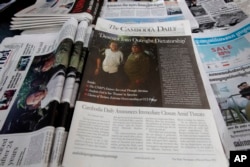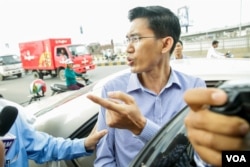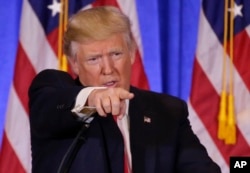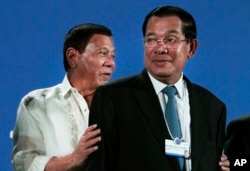Experts and activists have expressed dismay over deteriorating press freedom in Cambodia in recent months, amid a government crackdown on the political opposition, civil society and the independent media ahead of the country’s next general elections in July.
The Paris-headquartered Reporters Sans Frontieres (Reporters Without Borders) said in a report released last week that Prime Minister Hun Sen and his ruling Cambodian People’s Party (CPP) had left the free press “in ruins.”
“In a simplistic, either-with-us-or-against-us strategy, the regime is now in the process of banning, obstructing, or intimidating all independent media outlets that might refuse to toe the official line,” Daniel Bastard, head of RSF’s Asia-Pacific Desk, said in its new report Cambodia: The Independent Press in Ruins, which was released on February 14.
In early September, Kem Sokha, the leader of the opposition Cambodia National Rescue Party was arrested and later charged with treason for alleged collusion to overthrow the government. Two months later, the CNRP was dissolved by the Supreme Court at the government’s behest, while all the party’s 118 senior members were banned from political activities for five years.
At the same time, a number of independent media outlets and organizations were closed or suspended, and more than a dozen radio stations were ordered to either shut down or cease broadcasting Khmer-language news from Voice of America, Radio Free Asia and Voice of Democracy.
Just a day after Kem Sokha’s arrest, one of just a handful of independent newspapers in the country, The Cambodia Daily was forced to close after 24 years of operation following a government-imposed order to pay back taxes of $6.3 million. Only days later, RFA’s Phnom Penh news bureau also shut down due to similar pressure over a tax bill. And at least five former journalists, including a filmmaker, have been charged by Cambodian prosecutors in three separate cases within the past eight months.
Cambodian Aun Pheap and Canadian Zsombor Peter, both former reporters with The Cambodia Daily, were charged in August with “incitement to a crime” under articles 494 and 495 of Cambodia’s penal code. The charges stemmed from questions about politics they asked villagers while covering last June’s commune elections campaign in Pate commune of the northeastern province of Ratanakkiri. If found guilty, the journalists, both of whom have left the country indefinitely, could face a two-year jail term.
“Asking questions during an election campaign has absolutely nothing to do with inciting crime. This is what we call journalism,” Daniel Bastard said.
Two former RFA reporters, Uon Chhin and Yeang Sothearin, were also charged with espionage in another case in November. They were jailed following a warning from the Information Ministry that journalists would be arrested if they continued filing news reports to the US-funded broadcaster.
The pair were charged with “providing information that is destructive to national defense to a foreign state,” according to Ly Sophana, a spokesman for the Phnom Penh Municipal Court. If found guilty, they could face a prison term of up to 15 years each. Both journalists have vehemently denied the accusation, and their families and RFA have said the former reporters were no longer working for the radio station at the time of their arrest.
James Ricketson, an Australian filmmaker, was also charged with espionage for flying a drone over an opposition rally in Phnom Penh in mid-2017.
Pa Nguon Teang, the executive director of Cambodian Center for Independent Media, who himself was charged in a separate case and also fled the country last year, told VOA that these media professionals had done nothing wrong.
“To me, that was not an offense. The charges were just the government’s fear-spreading strategy,” he said.
Several independent journalism organizations, including the Cambodian Center for Independent Media, the Southeast Asia Press Alliance, the Overseas Press Club of Cambodia, and RSF, as well as the Committee to Protect Journalists, released a statement last week calling the government’s legal actions against these journalists “acts of intimidation, not due process.”
“The government clearly feels that a free and independent press will undermine its position ahead of crucial elections later this year,” Shawn Crispin, the Committee to Protect Journalists’ Southeast Asia representative, told VOA in an email.
“Hun Sen's regime aims to tightly control the narrative ahead of the polls by threatening journalists,” he said.
Government officials have repeatedly refuted such criticisms, insisting that there is no crackdown on press freedom.
“In the Cambodia Daily and Radio Free Asia cases, the government did not close them; they closed by themselves and left [the country],” Huy Vannak, an Interior Ministry undersecretary of state and the president of the pro-government Union of Journalist Federations of Cambodia, said at a media roundtable discussion hosted last month by the Cambodian News Channel, a private TV station where he serves as news director.
Sok Eysan, a spokesman for the CPP, said the cases against the charged journalists were based on “the rule of law” and that if they were innocent, they would eventually be released or the charges would be dropped.
“If they are not guilty, no one wants to arrest and keep them in jail, as that would just waste rice in the prison,” he told VOA.
He added that “just a few” media outlets had been forced to close down.
“How many media outlets among nearly a thousand still in operation have been in ruins now?” he asked. “Those ruined are only the ones who did not pay taxes, so if we just took one or two to represent the whole picture, that would be opposite to reality.”
The Trump Effect
Prime Minister Hun Sen, who has ruled Cambodia almost uninterruptedly for more than 33 years, has also defended himself and his government, saying authorities were just enforcing tax law impartially.
Speaking to journalists last month at a correspondents’ dinner in Phnom Penh, Hun Sen said, in an apparent reference to The Cambodia Daily and RFA: “Some media outlets were operating illegally in the country and evading taxes and, after we found out, they acted as if they were Cambodia’s political victims.”
In defense of his government’s actions, he pointed out that even in the U.S. “fake news” was a problem, citing complaints frequently made by U.S. President Donald Trump, as well as a parodic “fake news award” the president recently gave out.
Media freedom advocates say autocratic leaders around the world, in places including Syria, Venezuela, Egypt, and Southeast Asian nations like Malaysia and Thailand, are increasingly using Trump’s “fake news” rhetoric to delegitimize independent media outlets they do not like.
“It’s very unfortunate what happens in America, that other repressive governments like the government in Cambodia like other countries around the world, they see what’s happening in America, they say, ‘Well, it’s okay to crack down on media because the president of United States has said terrible things about the media,” Michael Abramowitz, president of Freedom House, told VOA in a recent interview.
“It’s hard enough to be a journalist in dictatorships like Cambodia when the United States is setting a good example,” Tom Malinowski, a former U.S. Assistant Secretary of State for Democracy and Labor, told VOA.
“Now every dictator who wants to ban media he doesn’t like can say, ‘Trump does it so why can’t I?’” said Malinowski, who served under President Barack Obama.
When hosting the U.S. president during last year’s ASEAN summit, the infamously outspoken Philippines President Rodrigo Duterte, who had previously used disparaging epithets to refer to journalists, also referred to reporters as “spies.”
“Journalism is not espionage,” James Ricketson, the Australian filmmaker who remains behind bar awaiting trial in Cambodia, told reporters while appearing at one of his hearings at the Supreme Court in Phnom Penh recently.
Unlikely to Resume Operations
John F. Lansing, chief executive officer and director of the Broadcasting Board of Governors, which oversees both VOA and RFA, said in a statement in August that the government’s clampdown on independent media was “disturbing” and a form of intimidation and harassment in the run-up to this year elections.
“We call on the Cambodian government to reverse this decision to muzzle objective sources of news and to allow all impacted stations to resume normal operations immediately,” he said.
But CPP spokesman Sok Eysan said there was no use in outsiders “shouting” and trying to put pressure on the government to heed their demands.
“To call a spade a spade, both RFA and VOA seem a bit tricky. They did not pay taxes nor did they register but they were operating by renting airwaves, so why didn’t they just pay taxes?” he told VOA.
“For The Cambodia Daily, if they pay the $6.3 million and ask to register to resume their operation, I think the Royal Government [of Cambodia] probably will not mind; we also want many independent foreign journalists,” he said.
But with regard to the five journalists currently in jail or charged with serious crimes, he said the cases were a matter for the judicial system.
“As for those journalists, they may want to find strong lawyers to defend them in courts,” he said.
However, both media and legal experts said they did not have much hope that the journalists would find an impartial hearing in the Cambodian courts, which have not been known for their independence.
“Cambodia's courts are notoriously pliable, so I doubt there is any credible legal remedy for journalists and media outlets targeted in the recent clampdown,” said Shawn Crispin of the Committee to Protect Journalists.
Jonathan Bush, a lecturer at Columbia Law School, told VOA in an interview that the legal system could easily be abused by authoritarian regimes by applying the letter of the law while ignoring its spirit.
“Obviously, these kinds of things narrow the democratic space in a way that is really sad,” he said of the situation in Cambodia. “One hopes that foreign NGOs and foreign journalist groups will allow the spotlight to shine and maybe let the government know that people are watching.”








